Some good news on Long Covid!
A major source for the previous pessimistic LC estimates, like Scott Alexanders (the UK's giant ONS survey) published an update of their previous report which looked at a follow-up over a longer time period. Basically they only counted an end to long covid if there were two consecutive reports of no symptoms, and lots of their respondents had only one report of no symptoms before the study ended, not two, so got counted as persistent cases. When they went back and updated their numbers, the overall results were substantially lower. This graphic explains their original mistake:

The new headline result is 7.5% of covid patients had 'some limitation' of daily activities after 12 weeks if you ask them if they had long covid. If you go by asking if there were any symptoms from a given list, the rate is lower (like 3%). The full report is here. What's notable is that a lot of participants reported LC symptoms with no covid positive test.
They break it down by age and sex in the full report, but you should treat these numbers as numbers for mostly double vaxxed AZ and some mixture of single/double vaxxed Pfizer/moderna for younger groups, since that's how it worked in the UK.
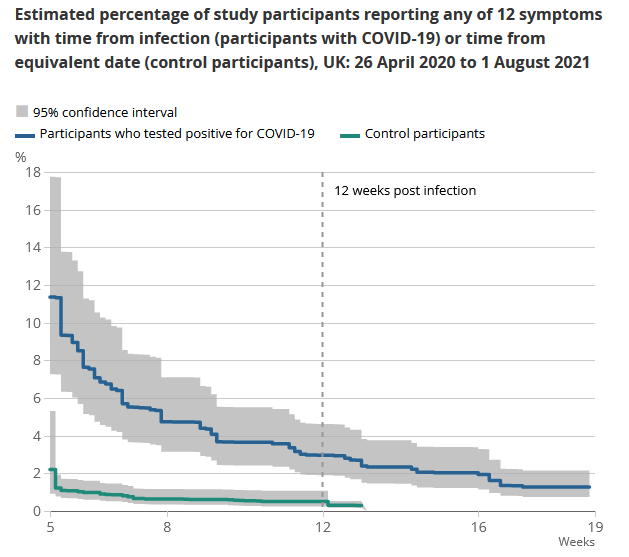
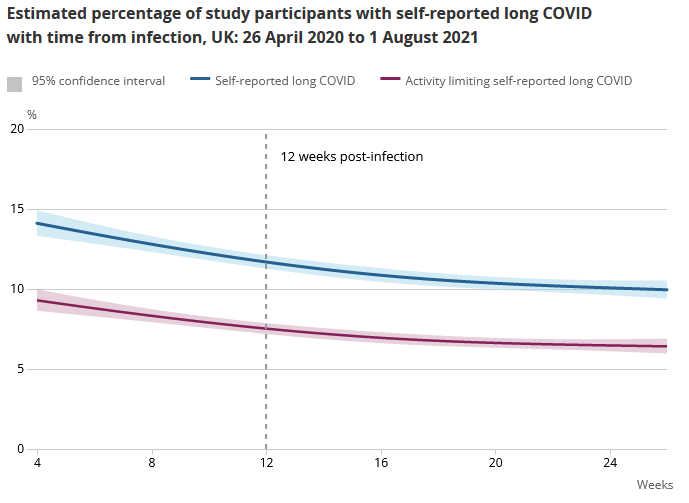
I continue to be highly skeptical of the idea that protection against infection declines by an order of magnitude, yet protection against hospitalization remains unchanged, which implies that the hospitalization rate for infections went down by an order of magnitude, and yes I’ve confirmed that such things are physically possible but it’s still downright bizarre.
I'm thinking of it like, vaccination builds you an awesome EMP gun to repel the invading robot army. But after a couple months if no robots have ever shown up at my fortress, c'mon, I'm not realistically gonna keep the anti-robot EMP gun charged and manned on my roof turret 24/7, instead I'm obviously going to bring it down to the basement armory for storage.
Then when the robots do come, it'll take a few minutes for me to bring the gun back up to the roof and mount it to the turret. And in those few minutes, maybe the robots will zap their way through some of my defenses at the far periphery of the fortress, like maybe my first layer or two of barbed wire and landmines. But then once my EMP gun is mounted on the roof turret, oh man, those robots are toast.
Right, I get that, but this is saying that with the death robots you fend off the attack 97% of the time, but without the death robots you also fend off the attack 97% of the time, so there were no cases where not having the death robots ready to go mattered, you always either had enough time without the robots OR the robots wouldn't have been enough anyway, and I'm kinda huh?
Um, maybe 3% of the time the defense deathbots have a design defect, and then it doesn't matter whether they're ready earlier vs later???
But yeah OK I get where you're coming from now. (Not an expert.)
One thing that occurred to me is that the difference might be smaller than it looks. "Infected" really means "infected enough that it spreads to the nasal mucosa, OR spraying enough virus from the lungs to leave some lying around there, so that we can catch it on a swab." In reality, "infection" is probably not a sharp line the way we try to draw it; the sharp line is "infected enough that we can see it."
Separate from that, this also seems to line up somewhat with my understanding about antibodies vs T-cells -- that antibodies respond faster but also fade faster, and so the results we see would be consistent with T-cell immunity being ~perfect, antibody immunity fading with time, and a 3% rate of nonresponse to the vaccine which doesn't successfully produce either kind of immunity.
This model would seem to imply that antibodies are redundant, if T-cells always catch things that slip through. I could imagine some explanations for that: perhaps covid is unusual in that; or perhaps the extra evolutionary benefit of being sick for less time is sufficient to "pay for it"; or the benefit of reducing the rate of passing diseases on to close relatives.
More like - you have a bunch of autofactories that build swarms of your own death robots that can absolutely decimate the attackers, but you only keep the actual death robots around manning your trenches for a few months before you dismantle them for parts. But the templates are still on file, so when the enemy horde comes crashing in, it takes you a few hours to rebuild your own death robot army from the template and decimate the attackers.
This op-ed from the WSJ from a couple of months ago differentiates between "internal" immunity, apparently conferred well by the vaccines, and "mucosal" immunity, not so well. So these positive tests among the vaccinated are largely confined to the nose and mouth, which limits their negative effect to the patient but still makes it possible to pass along to others. Presumably this is what's driving the results you're skeptical of.
Pro-vax Anti-vaxxer Gang wooo
In general, when I see someone give a whole rant that basically ends with "it's just a sad state of affairs, is all", I assume they're doing some underhanded signaling.
No one ever takes the time to write something out just because "it's sad". The thing they really want said is there in the subtext. "I'm sad because no one's surprised that our institutions suck" subtext: "Our institutions suck and it's really really obvious". But saying the latter is less sophisticated. If you want to make moves in the culture war while keeping plausible deniability, you hide the message in the subtext.
Zvi reveals the absurdity you get when you try to interpret the message at face value.
if I was sufficiently sick I would want it.
The problem is in the first few days of an infection you won't know whether you'll be sufficiently sick to be hospitalised on say day 10. We don't really know who will deteriorate on day 7 and beyond, and who will recover. And if you take the drug later it won't be as effective.
I suspect this drug will only be used for high risk groups, due to risk of side-effects and the high price (US is paying $700 per course).
I’m not fully in the ‘that which can be destroyed by the truth should be’ camp, but this does not seem like one of the worthwhile unprincipled exceptions.
This might be off topic, but does anyone (OP or otherwise) have examples of exceptions they hold?
Don't get me started on the refusal to take one particular salient risk factor into account with vaccine prioritization: being male. We've known that there are significant differences since the beginning of the pandemic, and now we're seeing evidence of immunity waning faster in men than women. I'll believe that the CDC and FDA are "following the science" when we start having an open discussion about this aspect.
What do you think of this?
Sweden and Denmark suspend the use of Moderna.
https://www.euronews.com/next/2021/10/07/sweden-and-denmark-suspend-use-of-moderna-covid-vaccine-for-younger-age-groups
I think these people are insane - or rather, the decision is insane and so are the incentives that are in place around such decisions. And having done this will doubtless backfire in various ways.
As far as I can tell, if they suspend one of two available mRNA vaccines this is bound to have zero effect on vaccination rates in the young because the other one can fill the gap.
If you completely neglect the effect this will produce on vaccine hesitant population, and consider only these Nordic countries which have plentiful supplies of both mRNA vaccines and over 70% vaccination rate.
These threads are so soothing to me these days. A reminder that most of the world is basically out of the literal mass death phase and just back into the politicians are long-term harmful, short-term irrelevant phase of life.
America's not spicy enough, but don't worry I've got Romania and Bulgaria taking another swing at unintentional herd immunity:
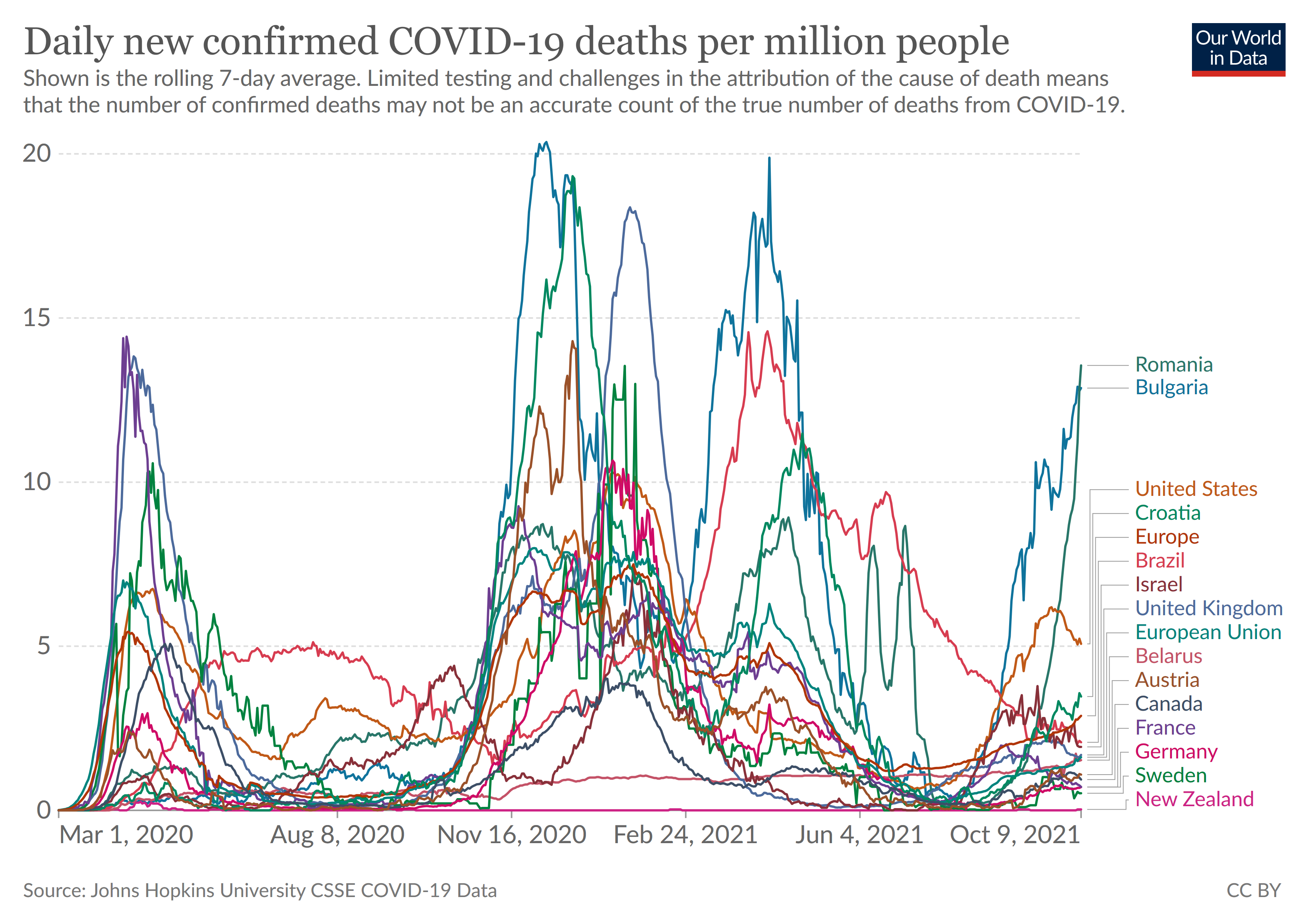
Look at that gorgeous vertical. "But it's OK, like everyone there is vaccinated by now, right?"
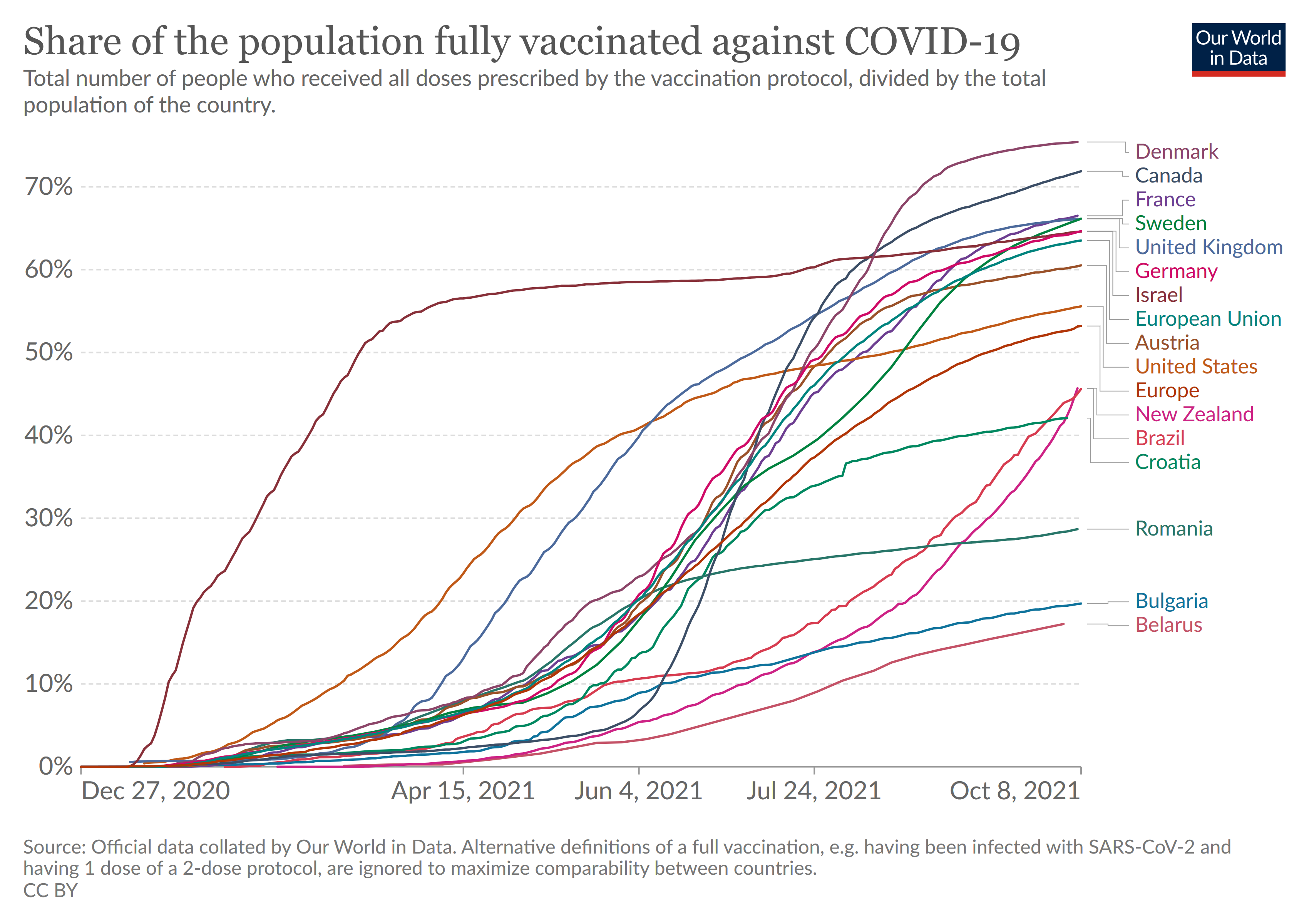
"But it's OK the governments are gonna lockdown and take control." Yeah, no nobody cares. Restaurants are as packed as the morgues.
There's a ritual in Romania where old people go and kiss a chest containing the bones of a saint. They queue up in big disorganised nose to nose crowds for it. Fortunately this year only a third of the usual number seems to be showing up. So like 15k+ instead of 50k+.
Yeah.
On the plus side literally anyone can get any vaccine and all my elderly family/friends have their boosters done. If you want a 3rd, 4th, 100th dose, just pop over, there's a vaccination centre at the airport, non-citizens welcome. Not really any queues. Everyone already knows the PLANdemic is a Bill Gates plot to sterilise bat populations around the world.
Please send help, someone shut down facebook for good this time.
"But it's not really facebook that's the problem, right?" Here's a flyer being handed out at a protest against lockdowns in a major city like a few days ago:
Some people can't handle the internet.
What happened here wasn’t that Harvard and the CDC stopped being interested in truth. That ship sailed a while ago. What happened here was that Harvard and the CDC’s lack of interest in truth was revealed more explicitly and clearly, and became closer to common knowledge.
Further, thinking and talking about organizations as if they were interested or disinterested in anything keeps leading to errors. CDC and Harvard likely have no institutional rules or incentives in place to promote truth over falsehood, or even to promote trust in the institutions themselves. (They may have "vision statements" or "principles", but these are, in practice, neither rules nor incentives for most people in an organization.) The people who were the first members of the organizations were very interested in and careful about truth and trust, and that's how the reputation arose. But the CDC was founded in 1946 and it's all different people now. This applies even more to Harvard, which was founded in 1636, but their current reputation was mostly formed around the same time. In the long run, one cannot trust future people flowing through an organization to do anything except obey the rules written in stone and the incentives in place. Even then, if rules are felt to be too restrictive it's likely future people will ignore, undermine, reinterpret, and outright rewrite them. And one can expect future people might do anything which is permitted by the rules and incentives, even if it would be unthinkable today.
The corollary is that one cannot trust organizational "character" not to change, and one must regularly update the reputation one attributes to an organization (really to the people in an organization), because the current people are regularly changing, both individuals simply changing over time and different people outright taking the place of previous ones.
The corollary to the corollary is that it can be helpful to have an estimate of the rate of turnover and mentoring in each organization, because that affects how long one can safely go without updating the rest of the reputation of the organization (which, again, is really the combined reputation of the particular people in that organization). Harvard professors likely have very low rates of turnover and excellent mentoring, so I wouldn't expect their teaching and research to have changed much in the last decade, but university administrators probably change jobs as often CDC administrators. Looking into it more deeply can give you an estimate of how often you'll have to re-evaluate the reputation of any particular organization. Every decade? Every five years? Yearly?
Another line of thought: what incentives and rules for an institution could one set up which would encourage desirable behaviour and discourage undesirable behaviour in all the future people who will take positions in the organization? Making progress on problems like this, where agents are human but have a very long future time in which to find and exploit loopholes, seems like an obvious prerequisite to making progress on AI alignment. One cannot simply trust that no future person will abuse the rules for their own benefit, just as one cannot trust that no AI will not immediately do the same.
Maybe if some progress were made on this, we could have some sustainable trust in some institutions. The checks-and-balances concept is a good start: set up independent institutions all able to monitor and correct each other.
Minor note: it looks like you misspelled Merck as "Merrick"in the second sentence and executive summary, and as "Merrik" later in the text.
For the second week in a row little has changed. The biggest news is that Merck has a new anti-viral pill that looks to be somewhat effective as a treatment. Otherwise, it should be a quick week. Which is good, since I spent the week moving (to New York City! to Manhattan! Woo-hoo!) and am quite exhausted. There were a few non-Covid things worth discussing given the lack of Covid news, but due to the time crunch I’m at least pushing them to next week.
Executive Summary
Let’s run the numbers.
The Numbers
Predictions
Prediction from last week: 630k cases (-10%) and 13,700 deaths (-1%).
Results: 621k cases (-11%) and 12,405 deaths (-13%).
Prediction for next week: 560k cases (-10%) and 11,500 deaths (-8%).
Often it’s tricky to make a prediction, but this is not one of those weeks. I expect only a small error here.
Deaths
A dramatic decline outside of the Northeast indicates we have turned the corner. The Northeast number is quite unexpectedly bad and does not seem to be an obvious data error, but I’d presume it’s mostly a fluke in some non-obvious way anyway, although the accurate death count shouldn’t peak there for another week or two.
Cases
Progress continues, slightly ahead of predicted pace. There’s no reason to expect that to stop for at least another few weeks, and a good chance it keeps going for a lot longer.
Vaccinations
There’s been a clear uptick in vaccinations, presumably due to mandates having an effect, but it’s also possible a lot of this is disguised booster shots.
Johnson & Johnson gives data overwhelmingly supporting booster shots, files for boosters. Those boosters remain technically forbidden.
Moderna plans to build a plant in Africa to produce 500 million vaccine doses per year. That’s excellent long term news (it will take 2-4 years to build because there’s no rush or anything) and reinforces that yes we could have built more capacity and decided not to.
Vaccine Effectiveness
New study out of the United States shows immunity to infection (but not hospitalization or death) waning over time (paper).
He points out that these results are still super awesome. I continue to be highly skeptical of the idea that protection against infection declines by an order of magnitude, yet protection against hospitalization remains unchanged, which implies that the hospitalization rate for infections went down by an order of magnitude, and yes I’ve confirmed that such things are physically possible but it’s still downright bizarre.
Most of my previous speculations about past studies and how they might have gotten their results still apply here, and I’d definitely accentuate the positive. Even if we take the result at face value, one must presume that most of these new infections are quite mild (since they result in essentially zero hospitalizations) and probably not that infectious, which is how the math is then able to work out.
Vaccine Mandates
Mandates work to get you a vaccinated workforce in multiple ways. The obvious ones are that your workers get vaccinated in response, others who don’t want to quit, and then you fire the ones that don’t do either.
Both methods are good, but causing vaccinations is better, so it’s good to keep track of which is which and not pretend they’re the same.
A non-obvious way is that you then get to hire a bunch of people who want to work in a fully vaccinated workplace. It turns out this is rather good for business, in a labor market where it’s tough to find good hires.
Here’s a new mandate, for those who want organ transplants.
In other news, I was informed that congratulations are due to most of my readers, you’re anti-vaxxers:
This joins the long list of terms that used to have a useful meaning, so at least some people are trying to extend that meaning, and now it’s hard to know what anything actually means.
EDIT: It seems like this change, while real, took place in 2018. So while this is totally an example of the thing, it’s not an example of the thing due to Covid. (Also edited other paragraphs to reflect this.)
Do you think the people who change the officially approved meanings of words in such ways think they are helping? I’d like to have a word for ‘thinks people should not take vaccines’ as opposed to ‘people should not be forced to take vaccines.’ Alas few can see a difference.
NPIs Including Mask and Testing Mandates
FDA finally approves Flowflex Covid test.
It’s about time, because, well…
I wonder how big this effect was, but I don’t wonder about whether the effect size was zero:
In Other News
Washington Post presents booster situation as ‘leading doctors’ asking to have boosters scaled back, and it looks like the reasoning of these ‘leading doctors’ is something like ‘because the CDC and FDA said so.’ If the authorities want people to die and you want to be an authority, you back them up.
On that note, Dominic Cummings has a post mainly not about Covid, this part seemed worth quoting here:
The Promising Pathway Act (MR) would greatly speed up new drug approvals going forward. Not sufficient, but at least a start, and this is a good window to attempt such matters.
Wonderful news: Merck has an anti-viral that looks like it works against Covid-19.
It takes a certain mentality to make this the first place one’s mind goes. If people want the vaccine less now that the benefits of the vaccine are reduced, then I’d ask you to consider what the alternative would mean.
Vaccines are held to impossibly high safety standards compared to drugs. This is in part because the person was previously healthy, and partly because vaccines have become a boogeyman that drives people nuts.
Yes, if one can contain the virus, the best thing to do is minimize circulation, but it’s quite possible we essentially failed to contain Covid-19 in the end, and it mostly burned itself out among the unvaccinated. Plus many are now arguing effectiveness against infection over time goes way down. Combine those, and it seems like vaccination is more of a ‘reduce severity’ play similar to treating the ill, and combining that with good treatment seems like a perfectly acceptable solution, at which point we wouldn’t need to do prevention. That’s what most excites me about a new treatment – that it could reduce the ‘price of infection’ for the vaccinated sufficiently to make many people sane again.
Here’s a technical explainer thread on the drug. Definitely not a full answer or better than the vaccine, but also seems better than nothing, and if I was sufficiently sick I would want it.
Finally, a fable about epistemics and Bayesian updating.
Like many pieces of news, how one should react to this news depends on what one already knew and believed before the news.
What happened here wasn’t that Harvard and the CDC stopped being interested in truth. That ship sailed a while ago. What happened here was that Harvard and the CDC’s lack of interest in truth was revealed more explicitly and clearly, and became closer to common knowledge.
In response, the people responded that they already knew about that, and identified as Jack’s complete lack of surprise. The scandals didn’t bother people because they weren’t news. They were expected. No one was updated. Except, it seems, the author?
That, my friend, is a you problem. Most people had better models and made better predictions, and your shock is a sign you need to update. That shock is a mistake that needs to be fixed. Whereas the lack of trust is not a mistake, it is accurate. And if you think it would be better if people’s models were instead inaccurate, then who is the one who cares about truth? It’s a sad state indeed that the CDC is not worthy of our trust, but it is less sad, given that, that we no longer trust it. We’re less likely to make mistakes as a result, and more likely to do more sensible things, and perhaps more likely to fix the problem. I’m not fully in the ‘that which can be destroyed by the truth should be’ camp, but this does not seem like one of the worthwhile unprincipled exceptions.